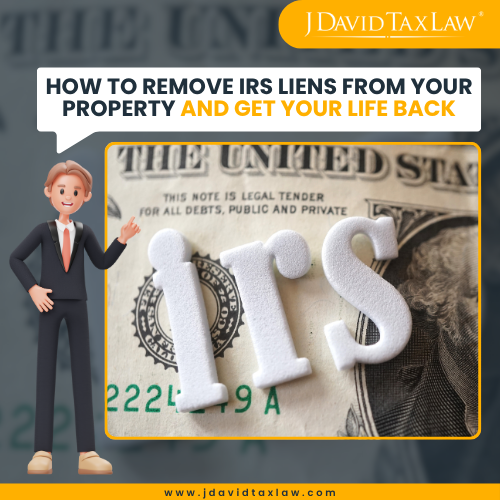
Yes, a tax attorney can negotiate with the IRS on your behalf,reducing penalties and resolving tax debt.Call our IRS tax relief attorney at (888) 342-9436.





Wage garnishment is a complicated and difficult financial challenge, but it doesn’t have to be. It’s a scenario no one wants to face, but it’s a reality for many.
The good news? You have options, and you can recover from this.
If you’ve just been notified that your wages are going to be garnished, it’s important to understand the process and your rights. Read on as we break down how wage garnishment works and what you can do to minimize its impact.
Wage garnishment is a legal process where the Internal Revenue Service (IRS) directs your employer to withhold a portion of your earnings to satisfy unpaid tax debts.
Unlike other types of garnishment, the IRS does not need a court order to initiate this process. Instead, they send a “Notice of Levy” directly to your employer. This instructs them to deduct a specified amount from your paycheck.
The wage garnishment process typically follows these steps:
Notice of Intent to Levy: Before garnishing your wages, the IRS will send you a series of notices. The first is typically a Notice CP14 (Balance Due), followed by a Notice CP501 (Reminder) and CP503 (Urgent). The most critical is the CP504, which is the Notice of Intent to Levy and the LT11 which is the final notice.
Final Notice and Right to a Hearing: After these initial notices, the IRS will send a Final Notice of Intent to Levy (LT11/CP90/CP297) and your right to a hearing at least 30 days before the garnishment begins. This notice gives you one last opportunity to resolve your unpaid debt before the tax levies take effect.
Employer Notification: If you do not resolve the debt or request a hearing, the IRS will send a “Notice of Levy on Wages, Salary, and Other Income” (Form 668-W) to your employer. This form instructs your employer to withhold a portion of your wages for the IRS.
The amount the IRS can garnish from your wages depends on your filing status and the number of dependents you claim.
The IRS uses Publication 1494 to determine the amount exempt from federal levy. This is based on the standard deduction and the number of exemptions claimed on your tax return. The remaining amount of your paycheck can be garnished, leaving you with a reduced income.
Federal law, on the other hand, limits the amount that can be garnished from your wages to ensure you retain enough income to cover basic living expenses. Under the Consumer Credit Protection Act (CCPA), the maximum amount that can be garnished is the lesser of:
25% of your disposable earnings for the week, or
The amount by which your weekly disposable earnings exceed 30 times the federal minimum wage.
Disposable income is the amount left after legally required deductions (such as taxes and Social Security) have been taken from your gross pay.
Did you know the wage garnishment lawyers at J david Tax Law can release wage garnishments in 48 hours?
Carefully read through the garnishment notice to understand the details. The notice will specify the amount of tax debt owed, the portion of your wages to be garnished, and any deadlines for responding or taking action. Ensure that all the information is accurate and that the debt belongs to you.
Consulting a tax debt attorney from J. David Tax Law can provide you with expert advice for your specific situation. They can help you understand your rights, explore available options, and negotiate with the IRS to reduce or eliminate the garnishment.
Here are some of the benefits of getting hiring J. David Tax Law:
Review your case and identify any errors or discrepancies.
Requesting a Collection Due Process (CDP) hearing to dispute the garnishment.
Proposing alternative solutions such as installment agreements, hardship stats/currently non collectible statuses or Offer in Compromise.
Representing you in negotiations with the IRS.
Call us at (888) 342-9436 to find out if you’re qualified to stop wage garnishment in less than a minute
Double-check the notice for any errors. Sometimes mistakes can occur, such as incorrect debt amounts or misidentification. Verify your tax records and any previous correspondence with the IRS to ensure the garnishment is legitimate.
Make sure the debt being collected is valid. If you believe there is a mistake or if you have already settled the debt, gather any documentation that supports your case. This could include payment receipts, settlement agreements, or communication with the IRS.
If you find any discrepancies or need clarification, contact the IRS immediately. Use the contact information provided in the garnishment notice. Explain your situation and provide any evidence of errors or previous payments.
In case of a Final Notice of Intent to Levy, you have the right to request a Collection Due Process (CDP) hearing within 30 days. During this hearing, you can dispute the garnishment or propose an installment agreement or an offer in compromise.
Working with a tax debt attorney can provide you with several strategies to resolve the IRS wage garnishment and manage your tax debt effectively. Here are some resolution options your J. David Tax Law attorney can help you explore:
Your attorney can help you negotiate an installment agreement that allows you to pay off your debt in manageable monthly payments. They will work with the IRS to find a plan that fits your budget.
If you cannot afford to pay the full amount of your tax debt, you might qualify for an Offer in Compromise (OIC). This program allows you to settle your debt for less than the full amount owed.
If you are experiencing significant financial hardship, your attorney can request to place you in Currently Not Collectible status. This temporarily halts collection activities, including wage garnishment, if the IRS determines that you cannot pay your debt without undue hardship.
Receiving an IRS wage garnishment notice can be a challenging experience, but remember that you’re not alone. Many people have successfully navigated this process and come out on the other side.
Here at J. David Tax Law, we focus on providing compassionate, solution-oriented assistance for dealing with wage garnishment. Our knowledgeable team guides you through stopping garnishments and reclaiming your financial well-being.
Contact us today to schedule a free tax consultation to stop wage garnishments and resolve tax debt issues.
Our tax relief attorneys specialize in tax problems and tax debt resolutions
Get started with a 100% free consultation

Yes, a tax attorney can negotiate with the IRS on your behalf,reducing penalties and resolving tax debt.Call our IRS tax relief attorney at (888) 342-9436.

Struggling with IRS and state tax debts? Learn how to deal with your situation without missing deadlines or risking enforcement. Call (888) 789-5011 for a free consultation!

Remove IRS tax liens through payment, withdrawal, discharge, or subordination. Learn which option fits your situation. Call (888) 789-5011 for free legal consultation.
Get IRS Tax Assistance Within 24 Hours